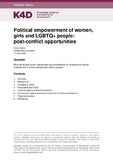Political Empowerment of Women, Girls and LGBTQ+ People: Post-conflict Opportunities
Abstract
The instability and upheaval of violent conflict can break down patriarchal structures, challenge traditional gender norms and open up new roles and spaces for collective agency of women, sexual and gender minorities (SGM), and other marginalised groups (Yadav, 2021; Myrittinen & Daigle, 2017). A recent study on the gendered implications of civil war finds that countries recovering from ‘major civil war’ experience substantial improvements in women’s civil liberties and political participation—complementary aspects of political empowerment (Bakken & Bahaug, 2020). This rapid literature review explores the openings that conflict and post-conflict settings can create for the development of political empowerment of women and LGBTQ+ communities—as well as challenges. Drawing primarily on a range of academic, non-governmental organisation (NGO), and practitioner literature, it explores conflict-affected settings from around the world. There was limited literature available on experience from Ukraine (which was of interest for this report); and on specific opportunities at the level of local administrations. In addition, the available literature on empowerment of LGBTQ+ communities was much less than that available for women’s empowerment. The literature also focused on women, with an absence of information on girls. It is important to note that while much of the literature speaks to women in society as a whole, there are various intersectionalities (e.g. class, race, ethnicity, religion, age, disability, rural/urban etc.) that can produce varying treatment and degrees of empowerment of women. Several examples are noted within the report.
Citation
Haider, H. (2022). Political empowerment of women, girls and LGBTQ+ communities: post-conflict opportunities. K4D Helpdesk Report 1156. Institute of Development Studies. DOI: 10.19088/K4D.2022.108DOI
10.19088/K4D.2022.108Is part of series
K4D Helpdesk Report;1156Rights holder
© Crown copyright 2022Sponsor
Foreign, Commonwealth and Development Office (FCDO)Collections
- K4D [937]

